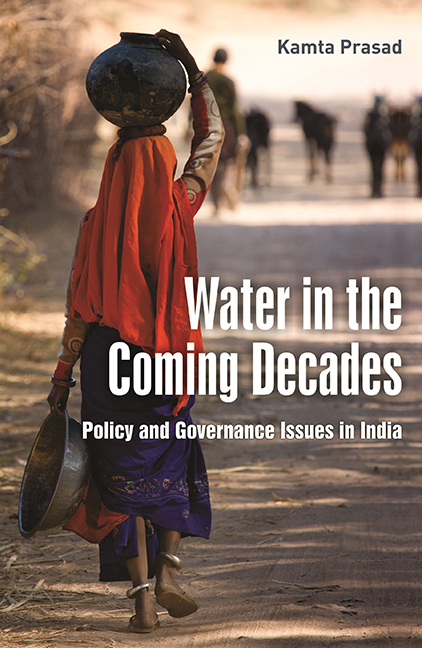Book contents
- Frontmatter
- Dedication
- Contents
- List of Tables
- List of Abbreviations
- Preface
- Acknowledgements
- Section I Overall Perspectives
- Section II Situational Analysis
- Section III Socio-economic, Institutional and Environmental Aspects
- Section IV Technological Options
- Section V Concluding Observations
- References
- Index
19 - Groundwater Governance
Published online by Cambridge University Press: 13 July 2022
- Frontmatter
- Dedication
- Contents
- List of Tables
- List of Abbreviations
- Preface
- Acknowledgements
- Section I Overall Perspectives
- Section II Situational Analysis
- Section III Socio-economic, Institutional and Environmental Aspects
- Section IV Technological Options
- Section V Concluding Observations
- References
- Index
Summary
This chapter makes a comprehensive analysis of groundwater governance, one of the most important issues facing the water sector in India at present. It analyses the institutional measures taken to deal with the challenge, explains the reasons why these were not effective and suggests an alternative framework.
Phenomenal expansion of groundwater and the challenge of governance
As pointed out in Chapter 5, groundwater has emerged as the most important source for irrigation as well as for other uses of water, including domestic and industrial. It has been a major factor in raising agricultural production and productivity and sustaining subsistence farming for millions of small and marginal farmers. It has played an important role in helping food security and poverty alleviation.
The stage of groundwater development increased from 37.2 per cent in 1998 to 61 per cent in 2009. This has resulted in over-exploitation of this resource in several areas. It is a matter of special concern that over-exploitation has become an acute problem in a number of agriculturally important states, e.g. Punjab, Haryana, Gujarat, Maharashtra, Rajasthan, Uttar Pradesh and Tamil Nadu, with adverse implications for agricultural production and food security. Besides, there are adverse impacts on water quality, health, livelihood and environment. Groundwater flow to rivers also tends to decrease, resulting in reduced supply for canal irrigation and drinking water. Other adverse effects include increase in cost of pumping, decrease in yield, expenditure on replacement or upgradation of pumps, non-functioning of hand pumps, etc. The situation of over-exploitation is not only unsustainable but also iniquitous. It favours better‑off farmers who are already enjoying greater benefits from groundwater as against small and marginal farmers who derive less benefits due to increase in costs of extraction and consequent reduction in accessibility to the resource.
How to check the fast depleting groundwater reserves has, therefore, become a major challenge in India at present. Supply-side measures such as recharge through rain water harvesting may reduce the problem to some extent but cannot solve it altogether because of the limited potential. Hence, the paramount need is to moderate demand in water-stressed areas so as to bring about equilibrium between demand and supply.
- Type
- Chapter
- Information
- Publisher: Foundation BooksPrint publication year: 2014



